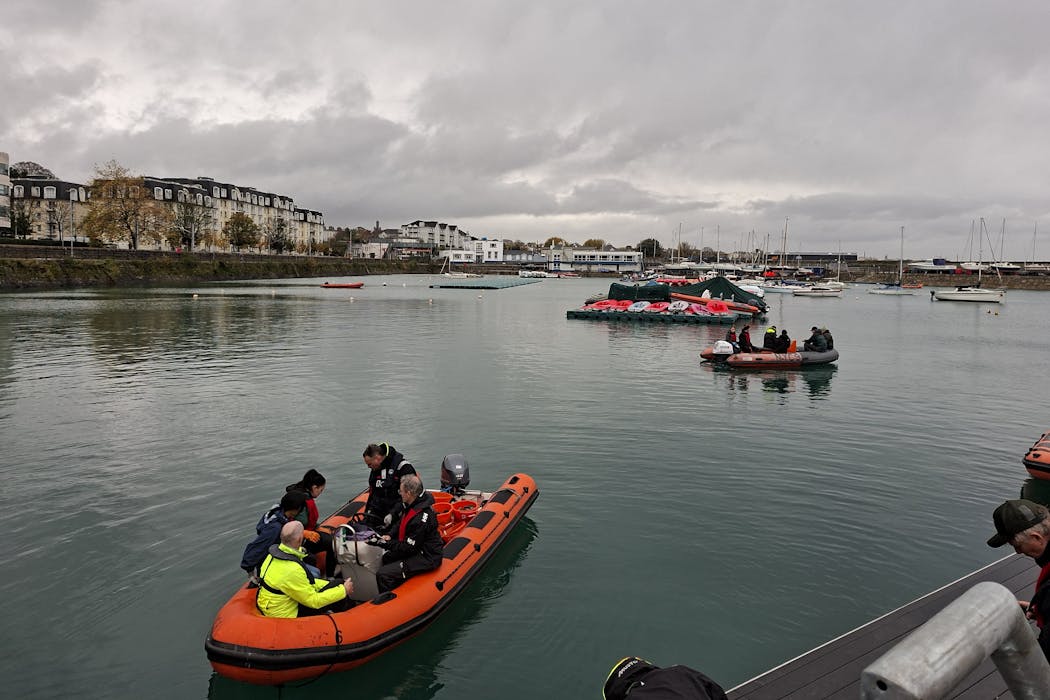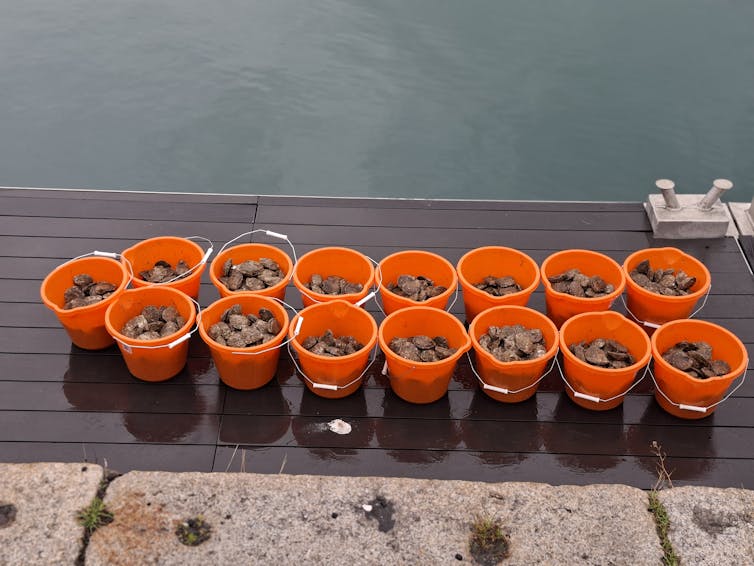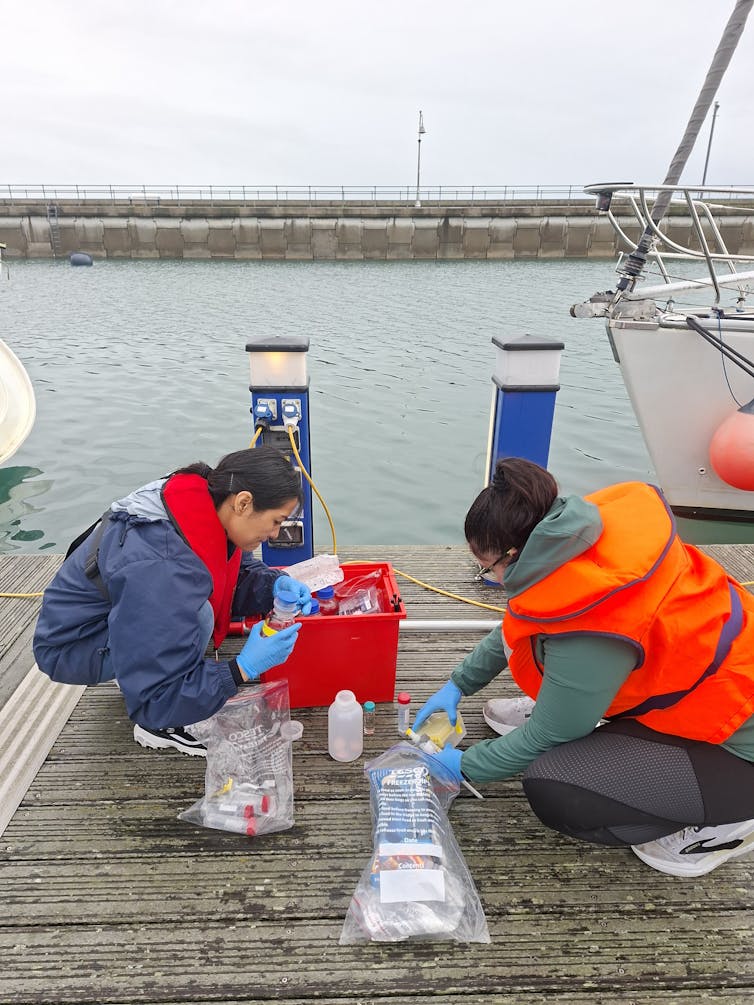Source: ForeignAffairs4
Source: The Conversation – UK – By Fiona Regan, Full Professor of Chemistry and Director, DCU Water Institute, Dublin City University

For over 200 years, native oysters (Ostrea edulis) have been absent in Dublin Bay. Once abundant along the Irish coast, they thrived in the sheltered estuaries and tidal flats that shaped the city’s maritime life.
Historical records from the 18th and early 19th centuries describe vast oyster beds stretching across the bay. They were a vital food source, a cornerstone of coastal trade and a symbol of Dublin’s connection to the sea. By the mid-1800s, however, the beds had collapsed.
A combination of over fishing, industrial pollution, development, habitat destruction, and disease decimated the population. It left behind only fragments of shell in the sediment as traces of what had once been a thriving marine ecosystem.
Oyster fishing along the Irish south-east coast is well documented. While oyster cultivation, breeding and growing oysters in Ireland dates back to the 13th century, consumption of oysters here has been a tradition for more than 4,000 years. The widespread disappearance of oyster beds mirrored a broader story – the loss of ecological richness that accompanied urban expansion and industrialisation.

Fiona Regan
Now, through collaborative efforts led by the Green Ocean Foundation, a not-for-profit marine environmental organisation, as well as local volunteers and the Dublin City University Water Institute, the oyster is making a return. The reintroduction of oysters to Dublin Bay represents more than ecological restoration – it’s a revival of cultural heritage and collective memory.
In November 2025, more than 18,000 oysters have returned to the bay as part of a project that goes far beyond species reintroduction. Housed in 300 floating flip baskets, these oysters will breed future generations.
The baskets are connected along a 100-metre line and are flipped at monthly or bi-weekly intervals (depending on the season), and are in a sheltered area of Dun Laoghaire harbour. David Lawlor, co-founder of Green Ocean Foundation, said that the flipping technique allowed birdlife to remove fouling that could otherwise restrict the flow of seawater through the baskets. Overall, this project is showing how oysters can deliver significant benefits for our coasts and environment.
Oysters and clean water
Each new bed seeded in the bay has the potential to restore not just biodiversity. By building a scientifically supported re-introduction project – it can also provide the proof needed that even the most degraded environments can heal when science, policy, and community unite behind a shared vision.
Oysters are nature’s quiet custodians. Each one can filter up to 200 litres of water a day, drawing in microscopic algae, sediments and pollutants, and potentially releasing cleaner water back into their surroundings.
When established, an oyster reef functions like a natural water treatment plant, a living system that not only purifies but also stabilises shorelines, creates habitat for marine life, and buffers against the impacts of coastal erosion.
Researchers are aiming to restore and reimagine the role of the oyster. DCU’s work combines field monitoring, in-situ sensors, chemical analysis and biological assessment to understand how oysters grow and survive under fluctuating environmental pressures, including pharmaceuticals, pesticides, legacy pollutants and microplastics.
By examining oyster health, shell composition, and biochemical responses, researchers are using these organisms as biological indicators of ocean health. They become early-warning sentinels that reveal broader changes in coastal ecosystems.
DCU scientists are assessing how effectively oysters filter contaminants from marine waters. The team quantifies the natural purification capacity of restored reefs by mapping how they move through the oyster’s filtration system. Research suggests that oyster beds can substantially reduce suspended solids and organic pollutants, functioning as nature-based treatment systems that complement, and in some cases rival, engineered approaches.

Fiona Regan.
Below the surface, oyster reefs create complex habitats that support juvenile fish, crabs and seaweeds, helping to rebuild the biodiversity that once characterised Ireland’s estuaries. The project includes efforts to establish a genetic fingerprint for restored populations, enabling researchers to track how restoration influences both water quality and ecological recovery.
In time, advanced tools including non-target contaminant screening, gut microbiome analysis, histology (the study of cell and tissue structure), and molecular diagnostics will be applied to assess oyster health, growth, and stress responses. (Non-target screening uses high-resolution mass spectrometry to detect and identify a broad spectrum of known and unknown contaminants.)
This project is built on collaboration. DCU scientists bring the scientific rigour, ensuring that every action is guided by evidence and long-term impact, and the Green Ocean Foundation has set out a vision for sustainable marine restoration. But perhaps most importantly, the real momentum comes from local volunteers and companies who roll up their sleeves to help.
This fusion of corporate responsibility, citizens, scientists and environmental education is creating a new model for how business and society can work together to tackle environmental recovery.
Don’t have time to read about climate change as much as you’d like?
Get a weekly roundup in your inbox instead. Every Wednesday, The Conversation’s environment editor writes Imagine, a short email that goes a little deeper into just one climate issue. Join the 47,000+ readers who’ve subscribed so far.
![]()
Fiona Regan receives funding from Enterprise Ireland.
– ref. Thousands of oysters are being re-introduced to Dublin Bay as nature’s super water cleaners – https://theconversation.com/thousands-of-oysters-are-being-re-introduced-to-dublin-bay-as-natures-super-water-cleaners-269868
